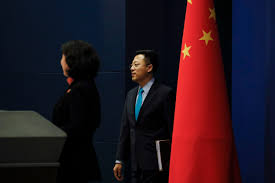China condemns US political oppression against Chinese media in the country

Beijing: China strongly opposes and condemns the U.S. State Department’s political crackdown on the U.S. offices of the Chinese media out of Cold War mentality and ideological prejudice on shaky ground, Foreign Ministry spokesperson Zhao Lijian said Tuesday.
The U.S. State Department announced Monday that the U.S. government will cap the number of Chinese citizens permitted to work for the five Chinese media groups that were designated as “foreign missions,” effective March 13, China Economic Net reported.
“Considering where the China-U.S. relationship now stands, what the United States has done will have serious negative impacts and damage bilateral relations,” Zhao told a press briefing.
“We urge the United States to immediately change its course and correct its wrongdoings. The Chinese side reserves the right to respond and take further actions.”
Zhao said Chinese journalists stationed in the United States have been strictly abiding by U.S. laws and regulations and carrying out news reporting under the principle of objectivity, fairness, truthfulness and accuracy. “Their professionalism is well recognized. The U.S. side has no basis and reason to take such an action against Chinese journalists.”
The U.S. side has been escalating the oppression against Chinese journalists from listing the Chinese media as “foreign agents” to designating them as “foreign missions” and now to capping the number of their Chinese employees, which means de-facto “expulsion” in a limited time, Zhao said.
“Because of their mounting oppression, Chinese journalists’ normal reporting activities, the reputation of the Chinese media and normal people-to-people exchanges between the two sides have been gravely damaged,” said Zhao.
While priding itself on freedom of press, the United States now disrupts and obstructs the Chinese media doing their job, Zhao said. “Such a two-faced behavior exposed its hypocrisy in so-called freedom of press, nothing short of double standards and bullying.”
When asked to comment on the U.S. announcement that the purpose of such measures is to seek “reciprocity,” Zhao said China has never instituted any caps on the number of offices and employees of U.S. media in China. “It is their own choice to make on how many people they want to send here, not a result of China’s restriction.”
Zhao said the United States had rejected and delayed issuance of visa to Chinese journalists since 2018 to restrict their going to the United States, and at least 21 Chinese journalists have been denied visa since last year.
“On top of all that, this time, the United States has decided to ‘expel’ 60 Chinese employees of these Chinese media in the country, under the pretext of capping their number. Can this be called ‘reciprocity’?”
According to Zhao, China only has nine media agencies in the United States while there are 29 U.S. media groups in China.
He also noted that while the U.S. journalists enjoy multiple entries of China with their visa, the United States has taken discriminatory measures targeting Chinese journalists by issuing single-entry visa, which means Chinese journalists will have to reapply for their visa if they go back to China briefly or even visit their families during their tenure, not to mention the 354 U.S. dollars of their visa fee, which is twice as much as the fee China charges. “Can this be called ‘reciprocity’?” Zhao asked.
“The United States wants ‘reciprocity’ with us. Does it also want that with other countries’ media?” he continued.
Zhao said the U.S. constant request for reciprocity is essentially prejudice, discrimination and aversion against Chinese media.
“The United States is guilty of foul play first. We will simply do what we have to do.”





